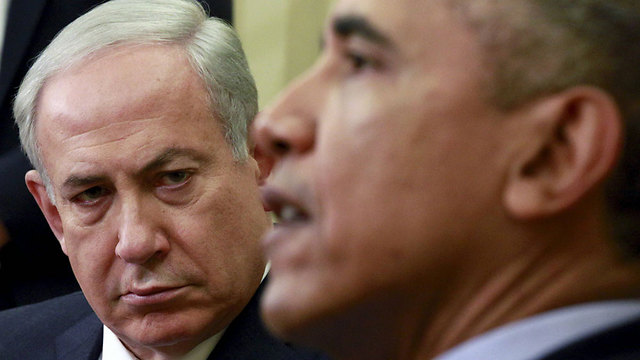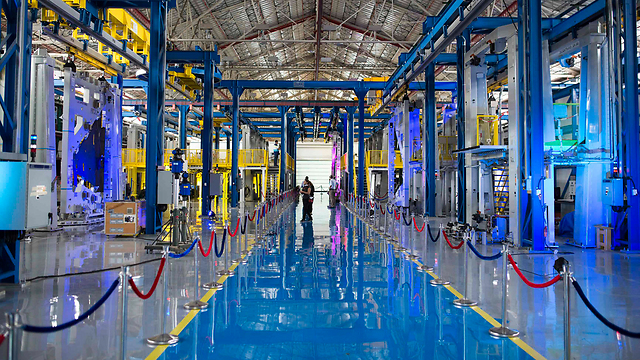
The $30 billion (or more) question: Why is the US military aid package so important?
Analysis: What is the disagreement about? What's a memorandum of understanding? Who wants to sign with Obama, and who would rather wait? Should we have sorted this out before the Iran deal? Questions and answers about the terms and conditions of US military aid to Israel.
The White House informed Congress on Friday that it wanted to increase the amount of money in the military aid package for Israel, the New York Times reported.
According to the package's reported terms, Israel will be required to use the money that they receive in the deal (currently expected to be more than $30 billion) to purchase American-made products. Previously, Israel was permitted to spend some of that money domestically.
What is the US military aid package?
It's a decade-long memorandum of understanding (MOU) between the two countries that lays out American military to Israel. The last MOU was signed on August 16, 2007 and took effect from 2009 to October 2018. A new MOU is to take effect from the 2019 fiscal year until 2028.
The last package provided US foreign military financing (FMF) in the amount of $3.1 billion per annum—$31 billion in total. This was an increase from the $24 billion per annum from the preceding decade. The FMF was intended for purchasing military equipment and weapons from the US, though about a quarter was permitted for Israeli-made purchases.
Military aid from the US to Israel began in 1962. Before that, America had placed an arms embargo on Israel. In addition to the aid included in the MOU, the US has tended over the years to grant Israel special aid for various purposes, including further development of defense systems against missiles (Arrow 3 and David's Sling) and interceptors (Iron Dome), closing gaps in inventory after rounds of fighting, and developing technology to detect tunnels after Operation Protective Edge. This special aid amounts to hundreds of millions of dollars a year.
Why didn't Israel sign before the Iran deal? Did we miss our opportunity?
This is a central point that darkens the military-economic negotiations: the murky personal relationship between Prime Minister Benjamin Netanyahu and President Barack Obama. Obama wants to sign the deal at any price before his term ends in January, leaving behind a legacy of taking care of Israel's security and that, during his administration, the military aid to Israel was higher than under any other president. This is in direct opposition to claims by Republicans and sources close to Netanyahu that he "threw Israel under the bus."
Last year, during talks between Iran, the US and other leading powers, Netanyahu froze the negotiations on the military aid package and rejected pressure from Obama to hold talks with the guarantee that the US would display extra generosity and make it worth Israel's while. The PM claimed then that holding negotiations at the same time that the US was holding talks on a bad deal with Israel's biggest enemy would be granting an Israeli seal of approval to the deal that it so fervently opposed.
A series of senior officials in Israel—from the IDF and political establishments both—implored Netanyahu, "Don't push away Obama's outstretched hand; Israel will pay a heavy price for it." They claimed that the PM had to accept the American offer and not wait until the Iran deal was signed, when the USA would no longer really need Israeli support. Gulf states understood then what Netanyahu did not, and they rushed to sign deals with Washington in which they received generous compensation in exchange for their silence on the nuclear issue. Netanyahu held steadfast in his refusal.
And indeed, after the nuclear deal with Iran was signed, Israel was disappointed to discover that, while the US did offer to increase its aid, it was far from what the Jewish State had hoped for. Senior cabinet ministers say today behind closed doors that the military package could have been significantly larger if Netanyahu had accepted it before the Iranian nuclear deal was signed. Netanyahu is certain that this is false and that there's no difference between what Washington intended to give before the deal and now.
What are the main disagreements that are holding up the MOU?
While the Americans are prepared to increase the aid, they added some sticking points that Israel was just not ready to swallow. The first is the limitation of "off-shore procurement" (OSP)—Israel spending a portion of the aid domestically. The existing agreement permits spending up to 26.3 percent of the military aid—i.e., $815 million—converting it into shekels and using it to purchase equipment and weapons systems in Israel. This is mainly used for systems that were developed in Israel and integrated with American weapons systems and also for Israeli maintenance of American arms.
Such a clause would be devastating for Israel. It would likely lead to the termination of thousands of workers in defense industries. Those in the field have also warned that it would damage the development of future weapons in Israel, but the money was never intended for development, just for equipping and maintenance. However, there are those who indirectly admit that there may be some damage in the local industries' development capacities.
The USA is also insisting that Israel cease purchasing fuel for military purposes with the FMF, so that the money will go directly for the purchase of US industry products. The IDF has alternative fuel sources, but the budgetary implication of this requirement is that some $400 million—in shekels—would need to be added to the defense budget.
The two countries agreed for the first time that the new package will include the aid for anti-missile defense systems. Until now, this was separately allocated in talks between Congress and the White House. Over the past decade, Israel has received, on average, $400 million per annum for these systems. Over the past three years, which included Operation Protective Edge, the average was $600 million. The White House announced this month a dramatic opposition to Congress's demand to grant Israel $600 million for missile defense.
Washington also insisted that it be included in the new agreement that Israel would not demand any special aid. That is, the end to asking friends in Congress to authorize an "extra." This is a very problematic demand from Israel's perspective. US Vice President Joe Biden hinted during his visit to Jerusalem last March that, if at the time of the agreement, new needs would come up, then the American government would know how to find the money to aid Israel, just as it had in the past with Iron Dome and dealing with the threat of tunnels.
Generally, the negotiations taking place are on the amount of FMF and on the terms. Some compromise proposals are on the table, such as a one-time grant to Israel that would remove the need for any future extra additions, allowing partial OSP, and others.
Does Netanyahu even want to sign with Obama administration?
It depends on who's asking. In February, the PM said to his ministers that he's not even sure if we'll reach an agreement with the Obama administration, and that if Israel doesn't receive sufficient aid for its military needs, then it will postpone signing until the entrance of a new American president in January to obtain the best possible terms. This statement infuriated the Americans and was interpreted as unmitigated gall.
To calm down the Israelis, good cop VP Joe Biden was sent the following month. Biden implored Netanyahu to sign the agreement by the end of the year and not to wait for the next administration. He explained that the US was dealing with large budgetary difficulties and that reaching a point where American public opinion was divided on providing aid to Israel was unacceptable. Nobody wants a situation where American citizens wonder why they're increasing aid to Israel and not transferring that money for domestic use, such as in health and education.
Netanyahu apparently appreciated that he had overreached, and he immediately made it clear that Israel is committed to efforts to sign the MOU during Obama's term. The acting national security advisor, Yaakov Nagel, said that Israel wants to sign an agreement with the present administration, but not at any price. Nagel made it clear that we're in the final stretch before a signature, and just a few weeks or months remained, but he refused to commit himself.
Defense Minister Avigdor Lieberman brought a large team with him to the US during his visit there the week before last, and he joined them for further talks in Washington. At their conclusion, Lieberman expressed optimism about the prospect of concluding the saga under Obama: "Both sides will make compromises, and I believe that we can sign the agreement by November."
Still, the Americans fear that Netanyahu is playing them, perhaps some exercise intended to gain time and postpone the signature till the next administration. The Prime Minister's Office promised to the Americans that their intentions were pure, but suspicion is great. The burden of proof here is on the Israeli side.
Should Israel wait for the next administration?
Just as Netanyahu erred in thinking the US will continue to be just as generous as it was before signing the agreement with Iran, he could be wrong on this account as well. Most signs are indicating that a new president, whoever that may be, will not offer Israel more aid money. Trump may be trying to portray himself as pro-Israel, but he has made comments in the past against aiding foreign nations and even said Washington should demand these countries to pay for the military aid they're receiving, including Israel. It's safe to assume that Trump, a vocal separatist, would rather invest the money in the American economy instead.
Even if Hillary Clinton gets elected, it is still not certain she would be able to offer a better deal, considering the insult of not signing the agreement during the Obama administration will still be fresh in the Democratic Party's minds.
In any case, whichever president is sworn in, he or she will not necessarily have time to deal with the issue of Israel's military aid, and will likely have to focus on far more urgent matters. This causes concern in the Israeli defense establishment.
It is not for nothing that both Lieberman and Finance Minister Moshe Kahlon are advising Netanyahu to accept the current American proposal and sign the deal.
What strategic implications will the agreement have on the IDF?
The IDF's new multi-annual plan, "Gideon," may have already received the final approval from the government and will be implementing in the coming five years, but the defense establishment is also looking ahead. Recently, the IDF chief accepted the Air Force's recommendation to acquire 17 new F-35 fighter jets, bringing the IAF's total to 50 new fighter jets by the middle of the next decade. This is part of a long-term plan to acquire a total of 75 jets. The new acquisition still requires an approval from the political leadership, and this will depend on the results of the talks over the military aid deal.
The future of other aircraft the IAF is set to receive will also depend on the military aid deal, such as the acquisition of the V-22 Osprey, an American multi-mission, tiltrotor military aircraft with both vertical takeoff and landing, and short takeoff and landing capabilities. It can also carry large amounts of supplies and troops.
Former Defense Secretary Chuck Hagel had already announced the US administration's decision to supply Israel with this special aircraft some two years ago, but the number of these aircraft and the schedule for their arrival depends on the military aid agreement.
Every clause in the new agreement will therefore affect the IDF's future force structure, including whether squadrons or field units will be closed ahead of the implementation of new measures.













